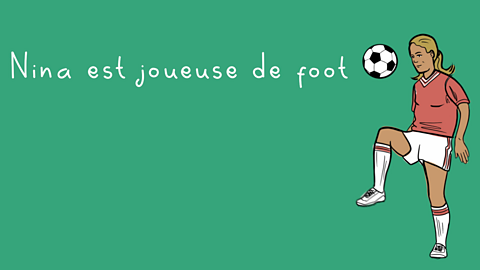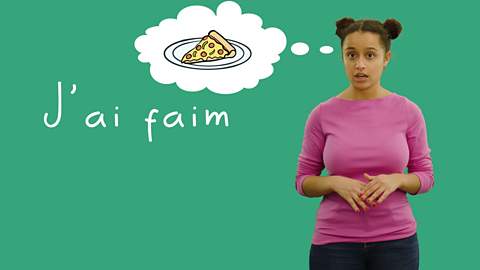Adjectives: How to describe people, places and things in French
You're going to want to describe nouns in French.
J'ai un chien - I have a dog is nice but… J'ai un chien mignon - I have a cute dog… is better!
The first thing to notice is that adjectives in French usually go after the noun.
J'ai une porte verte - I have a green door.
The next thing to notice is that the adjective must agree with the noun.
Une porte is a feminine noun which means that the adjective vert has a feminine ending 'e'.
If you have more than one of something like deux lapins blancs - two white rabbits, lapins is plural. Which means that the adjective has to be plural too. blancs has an s at the end.
If you have more than one girl les filles then any adjective has to be feminine and plural.
So content adds an e and an s - les filles contentes - the happy girls. Usually adjectives in French come after the noun but there are a few that don't.
beau - beautiful, comes before the noun,
bon - good, un bon livre - a good book,
and grand and petit also go before the noun.
Ma petite sœur - My little sister.
Mon grand lit - My big bed.
Now where's my cute black dog? **Où est mon chien mignon et noir?**
What is an adjective?
Adjectives are describing words. They tell us more information about nouns, such as the colour, size, age, etc.
Examples of adjectives include:
| French | English |
|---|---|
| bleu | blue |
| grand | big |
| petit | small |
| nouveau | new |
| vieux | old |
Where do adjectives go in relation to nouns?
In French, adjectives usually go after the noun:
- J’ai un chat noir - I have a black cat.
- Mon père a les cheveux courts - My dad has short hair.
However, most of the BAGS adjectives go before the noun. BAGS stands for Beauty, Age, Goodness and Size.
| Beauty | Age | Goodness | Size |
|---|---|---|---|
| beau / belle (beautiful) | vieux / vieille (old) | bon / bonne (good) | grand(e) (big) |
| joli(e) (pretty) | nouveau / nouvelle (new) | mauvais(e) (bad) | petit(e) (small) |
For example:
- J’habite dans une grande maison - I live in a big house.
- Ma copine a une nouvelle tortue - My friend has a new tortoise.
How do adjectives ‘agree’ with the noun?
Most adjectives in French change depending on whether they are describing a masculine, feminine or plural noun. The usual endings are as follows:
| masculine singular | masculine plural | feminine singular | feminine plural |
|---|---|---|---|
| (no ending) | -s | -e | -es |
- J’ai un vélo vert - I have a green bike.
- Tu aimes les haricots verts? - Do you like green beans?
- Ma tante mange une pomme verte - My aunt is eating a green apple.
- Mon oncle aime les voitures vertes - My uncle likes green cars.
There are some exceptions to this rule, however:
| masculine singular | masculine plural | feminine singular | feminine plural |
|---|---|---|---|
| un jeune homme (a young man) | des jeunes hommes (some young men) | une jeune femme (a young woman) | des jeunes femmes (some young women) |
| un homme heureux (a happy man) | des hommes heur*eux * (some happy men) | une femme heureuse (a happy woman) | des femmes heureuses (some happy women) |
| un homme sportif (a sporty man) | des hommes sportifs (some sporty men) | une femme sportive (a sporty woman) | des femmes sportives (some sporty women) |
| un homme fier (a proud man) | des hommes fiers (some proud men) | une femme fière (a proud woman) | des femmes fières (some proud women) |
| un gentil garçon (a kind man) | des gentils garçons (some kind men) | une gentille femme (a kind woman) | des gentilles femmes (some kind women) |
Some of the BAGS adjectives are irregular:
| English | Masculine singular | Feminine singular | Masculine plural | Feminine plural |
|---|---|---|---|---|
| beautiful | beau, bel | belle | beaux | belles |
| old | vieux, vieil | vieille | vieux | vieilles |
| new | nouveau, nouvel | nouvelle | nouveaux | nouvelles |
Examples using BAGS
Beautiful
- Le bel homme - The handsome man.
- Le beau chien - The beautiful dog.
- La belle maison - The beautiful house.
Old
- La vieille maison - The old house.
- Un vieux vélo - An old bike.
New
- La nouvelle maison - The new house.
- Un nouveau cinéma - A new cinema.
Nouveau, vieux and beau become nouvel, vieil and bel when used to describe a masculine noun that starts with a vowel or an ‘h’:
- Un nouvel ami - A new friend.
- Un vieil homme - An old man.
- Un bel appartement - A nice flat.
Quiz
Find out how much you know about adjectives in French in this short quiz.
GCSE exam dates 2025
Find out everything you need to know about the 2025 GCSE exams including dates, timetables and changes to exams to get your revision in shape.

More on Grammar
Find out more by working through a topic
- count3 of 7

- count4 of 7
